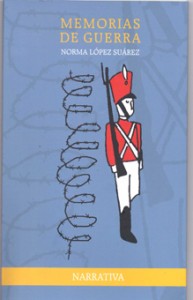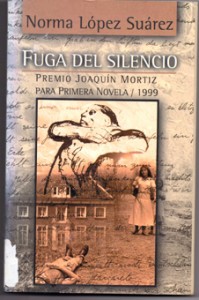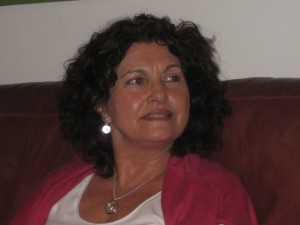Norma López Suárez’ War Stories
So we’ve taken the plane back to Mexico City. As the plane descends – this time in daylight –, it makes it through this brownish-yellowish-orangey dome of smog that extends over the city. In the distance, the mountains; one of them is the Popocatepetl which supposedly has the shape of a woman reclining. Below us is the network of houses and buildings and streets. After we land, and as we walk out of the airport terminal to the taxi stand, that smell of cloaca and dust – so characteristic of this particular spot in the city – welcomes us back. ‘How has the city been?’ I ask the taxi driver. ‘She’s been well’, he replies, and then he gives us an update of what has happened to ‘her’ in our absence. And just to make sure that you don’t pin her down: she does have more than one gender. When people speak of ‘la ciudad’, ‘the city’, it’s ‘she’; and when they speak of ‘el monstruo’, ‘the monster’ (beloved pet or hated beast, depending on the day), it’s ‘he.’
Let me take you away from the busy airport, the smell of cloaca, and the dust. We’ll go to an area of Mexico City that isn’t anything like this: La Condesa, ‘the Countess.’ La Condesa is beautiful, and she is admired and desired by many – and she knows it. She has leafy wide streets, bohemian cafés, chic restaurants with valet parking, bookshops that breathe intellectual versatility, people from all over the world. La Condesa used to be a private park; it then became a colonia of the middle classes, the literati, and the bohemians. It is now one of the most sought-after areas of the city; urbanly bucolic.
 It is within this setting that writer Norma López Suárez presents her new short story collection Cuentos de guerra (War Stories), at the Centro de Creación Literaria Xavier Villaurutia (http://www.literatura.bellasartes.gob.mx/index.php?option=com_content&id=105&Itemid=83)
It is within this setting that writer Norma López Suárez presents her new short story collection Cuentos de guerra (War Stories), at the Centro de Creación Literaria Xavier Villaurutia (http://www.literatura.bellasartes.gob.mx/index.php?option=com_content&id=105&Itemid=83)
Stories of peace in a Zapatista village, and War Stories in the Condesa?
Mexico City has been a metropolis of exile since the early 20th century: Trotskyites, Anarchists from Europe and the U.S., and European anti-Fascists found a – sometimes transitory – home in the country and in the city. Many of them were writers, among them B. Traven, Luis Cernuda, León Felipe, Egon Erwin Kisch, Ludwig Renn, Anna Seghers, Paco Ignacio Taibo I, and Bodo Uhse. In the 1970s, the governments of Luis Echeverría and José López Portillo granted asylum to exiles from the dictatorships of the Southern Cone, among them writers such as the late Juan Gelman. At the same time both presidents unleashed a vicious dirty war against dissidents and armed movements in their own country.
Norma López Suárez, writer and criminologist, came to Mexico in 1980. She was exiled from Argentina during the military dictatorship in 1978, and spent several years in Ecuador and Germany. Norma and I met years ago through the Academic Centre for the Memory of Our América (http://selser.uacm.edu.mx/Sitio_Camena/sitioCamena.html)1, but our shared story goes back further than this. Norma says that she very possibly would not have become a writer if she had not been exiled. Without people like Norma, I very possibly would not have studied poetics. The writings by exiles from the Southern Cone, and by those who were tied to them in relationships of solidarity, gave me that sense of urgency interlaced with the love for different languages and tonalities. And it was precisely that sense of urgency and their love for difference that rendered their stories, poems and struggles inaudible and incomprehensible in a public domain circumscribed by hegemonic patterns of perception and interpretation. Their clear-sighted vision on Europe let me see what Europe does not want to know about itself.
‘Years ago I read Laura Esquivel’s Like Water for Hot Chocolate’, Norma says, ‘And I loved it. Yet, I could never write a book like that, on the senses. But I do have a great sensitivity for war, and for everything related to the relationship between the subject and the State.’
 Norma tells us stories of wars that permeate seemingly peaceful environments. She writes from the perspective of those who refuse to accommodate themselves to the inertia and the deceit that are passed off as ‘peace’, and who remain faithful to their principles and their struggles for that peace with dignity and truthfulness. Her first novel Fuga del silencio (Fugue of Silence, 1999) is set in 1970s Germany; it’s the story of Bárbara, a young Salvadorean refugee. Through and with her characters, Norma shares her sharp, often disturbing view on the marginal existence of refugees and asylum seekers, on the unacknowledged presence of war in European societies, and on those few examples of solidarity and ethical coherence in1970s Germany which are silenced by hegemonic discourses of European superiority and charity.
Norma tells us stories of wars that permeate seemingly peaceful environments. She writes from the perspective of those who refuse to accommodate themselves to the inertia and the deceit that are passed off as ‘peace’, and who remain faithful to their principles and their struggles for that peace with dignity and truthfulness. Her first novel Fuga del silencio (Fugue of Silence, 1999) is set in 1970s Germany; it’s the story of Bárbara, a young Salvadorean refugee. Through and with her characters, Norma shares her sharp, often disturbing view on the marginal existence of refugees and asylum seekers, on the unacknowledged presence of war in European societies, and on those few examples of solidarity and ethical coherence in1970s Germany which are silenced by hegemonic discourses of European superiority and charity.
Fuga del silencio was written not for, but on Europe. The novel has been out of print for years, and it has not been translated into English or German. The novel is an opportunity – for Europeans: it’s a chance to engage with the perspective of an Other; of a refugee, a Latin American, a woman. It’s another chance to read with an open heart and, as we do so, to participate in the silence that listens.
Norma’s most recent book is a collection of three short stories: Cuentos de guerra (War Stories). One is set in Argentina, one in El Salvador, one in Germany. All three stories are based on real events, and all three focus on ethical dilemmas, betrayal, the price of so-called ‘reconciliation’, and on the faithfulness to strong personal attachments and commitments under impossible circumstances.
After criss-crossing the continent and the ocean, Norma attached herself to Mexico City. The metropolis of exile: a place where people of principle from many different places come together.
My name is Norma López Suárez, I am a writer, I have published a novel that received the Joaquín Mórtiz prize. The novel is called Fugue of Silence, it was published in 1999, and it focuses mostly on the conflict between the subject and the state in what was at the time the Federal Republic of Germany, and also about the conflict of the exiles, of the people who were there in exile, of the political problem they were confronting.
Your are Argentinian by birth…
I’m Argentinian by birth, Mexican by adoption, and Latin American also by adoption.
Why did you write a novel about Germany?
I wrote about Germany because while I was in exile, I lived in Germany for two years. And there you could feel very strongly the problems that were faced by the exiles. Sometimes, depending on the country, one was more marginalised by less marginalised. They were countries where the exhales were more rejected, others where we were less rejected. And I lived that directly.
When were you there?
From 1978 to 1980. My second child was born there, and from there we came here, and here I’ve stayed. I’ve chosen this country as my second home.
You’ve experienced many different cultures, always in the context of exile. How has that influenced your own writing?
Look, I think that if I had been exiled – I’m not sure that I would have written. Because if I’d stayed in Argentina… I had a very comfortable life there, with parents who loved me very much, a family that protected me, that protected me too much, very conservative. That that I had to go into exile allowed me to see other cultures, other ways of thinking, and from there I started to understand better the reality of Latin America. I started to understand Latin American reality better since I left for Germany, when I was looking at Latin America from Germany. Before I left for Germany, I left Argentina. I lived two years in Ecuador, this way I experienced the Andean area, and after that I went directly to Germany. So yes, I experienced this very deeply, and in some ways I owe it to exile that I became a writer.
So writing came from the urgency to deal with this?
Yes, writing came from the urgency to bring out the world that one carries… For example the short stories that are being presented today I titled Memories of War, because they are stories about situations of war, from the perspectives of three children in Germany during the Second World War, or of a man in the war in El Salvador, and another story is about the military dictatorship in Argentina. And where do these stories come from? Why did I call the collection Memories of War? Because they are based on real facts, sparks from stories that people because they had experienced them or because they had found out about them, and after many years – the story that is set in Argentina in 1980 – I went back to what I remembered and I changed it, of course, because one never copies reality. I modified them, I gave them texture and wrote them down so that they could be included in this book. And from there comes this entire experience, one listens, one lives and this is what my literature, my writing, is all about.
El Salvador is a recurring theme in your writing. In your novel the protagonist is Salvadoran.
 And imagine, I don’t even know why. When I was writing the first novel I decided that she was going to be Salvadoran, mainly because of the situation that El Salvador was going through at this time, and so I wrote the novel in this way. And later, with regards to one of the short stories, a Salvadoran friend who was there during the war shared with me in Mexico a very special detail, and I captured it for the second story. Yes, El Salvador affects me very much. I’ve never been there. I want to go, I very badly want to get to know the country because the Salvadorans who have read the novel and the short story tell me that yes, they capture the reality of El Salvador. But I would like to see for myself because I’m not sure that I achieved such closeness with reality. I won’t know until I’ve seen it.
And imagine, I don’t even know why. When I was writing the first novel I decided that she was going to be Salvadoran, mainly because of the situation that El Salvador was going through at this time, and so I wrote the novel in this way. And later, with regards to one of the short stories, a Salvadoran friend who was there during the war shared with me in Mexico a very special detail, and I captured it for the second story. Yes, El Salvador affects me very much. I’ve never been there. I want to go, I very badly want to get to know the country because the Salvadorans who have read the novel and the short story tell me that yes, they capture the reality of El Salvador. But I would like to see for myself because I’m not sure that I achieved such closeness with reality. I won’t know until I’ve seen it.
Can you tell us a little more about the motif of war? Also in the context of what we are living now. The Zapatistas say that we are living the Fourth World War.
What they’re saying about the Fourth World War is very interesting, because what we are living right now is very cruel, it’s not a direct confrontation of one country confronting another, and so many things are happening, so many people are suffering, the migrants, all the people who come from the south of Mexico and were crossing all of Mexico in search of something, and they live and die in the most horrific conditions. I can tell you one thing: I really like the novel Like Water for Hot Chocolate by Laura Esquivel, when it came out a few years ago. But I could never write a novel like that, about cooking, about smells, food. I never could. But I have a very keen perception for everything that is related to war, everything that relates to the conflict between the subject and the State, these things I perceive very keenly.
Because of your experience?
Maybe because of my own experience, because of exile. Exile for many years was for me a period of a wide silence, I remained quiet during exile. And then only many years later was I able to start writing about everything that I had – that I hadn’t even realised I was experiencing…
When one is in exile, one has a strange relationship to the State. States recognise you as a subject only partially…
… Or they deny you. They deny you. When I was living in Germany I saw a State which was very conservative, very controlling, compared with everything they said, compared with everything I dreamt about. Very controlling, and people need to express themselves in some way, they need to get out of that control. Sometimes the State wants to control us, wants to dominate us, it wants to tell us how we should be thinking, what we should do, and we accept it.
Is literature, or his writing anti-State?
No, I wouldn’t say that. Well, I’m close to anarchism but I think that we need a State and that we need forms of government, so that we can understand each other as persons, but the State shouldn’t think for us. It has to leave us the right to think. And I like that about here, the right to think, to say things, without them reglementing even the way we breathe.
Before we started to record we were talking about Mexico City as a city of exile, as a place of in country for exile cultures.
Well it’s a city that shelters many people. And in this city there have been Latin American exiles since the 1930s, or the 1920s. And European exiles. The first to arrive where the Peruvians, in the end even the Cubans came, those who didn’t agree and left, and the European exile from the time period of the Second World War – how many of them came here! This city is full of conflict because it’s very big, it may be too big, anything you may say, but it shelters the cultures that arrive here. And for this reason it would be very difficult for me to leave. I love this city very much. Well, I love the country. And the people. The people are marvellous.
